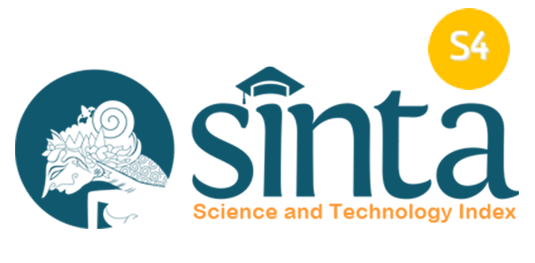Improving students’ mathematics learning outcomes through the implementation of think-pair-share model
Abstract
This research is a classroom action research which aims to improve mathematics learning outcomes through the application of the Think-Pair-Share type of cooperative learning model. The research subjects were 25 tenth grade students who consisted of 9 male students and 16 female students. The instruments used were observation sheets, response questionnaires, and learning outcomes tests. Data collection techniques in this study were information on student activities, implementation of actions, and students’ learning outcomes. Data on the observations of student activities and response questionnaires will be analyzed qualitatively, whereas data on students’ learning outcomes will be analyzed quantitatively using descriptive statistics. The results of this study showed that the application of the cooperative learning model with Think-Pair-Share model can improve students’ mathematics learning outcomes.
Keywords
Full Text:
PDFReferences
Almerino, P. M., Etcuban, J. O., De Jose, C. G., & Almerino, J. G. F. (2019). Students' affective belief as the component in mathematical disposition. International Electronic Journal of Mathematics Education, 14(3), 475-487.
Chen, B., Chang, Y. H., Ouyang, F., & Zhou, W. (2018). Fostering student engagement in online discussion through social learning analytics. The Internet and Higher Education, 37, 21-30.
Cotton, D. R., Warren, M. F., Maiboroda, O., & Bailey, I. (2007). Sustainable development, higher education and pedagogy: A study of lecturers' beliefs and attitudes. Environmental Education Research, 13(5), 579-597.
Di Martino, P., & Zan, R. (2010). ‘Me and maths’: Towards a definition of attitude grounded on students’ narratives. Journal of Mathematics Teacher Education, 13(1), 27-48.
Fauzi, Z. A., & Fikri, H. (2018). Improving learning activities using a combination of mind mapping model, think pair share and teams game tournament. In 1st International Conference on Creativity, Innovation and Technology in Education (IC-CITE 2018) (pp. 318-322). Atlantis Press.
Firdaus, A. M. (2019). Application of cooperative learning model type Think Pair Share (TPS) on mathematical communication ability. Daya Matematis: Jurnal Inovasi Pendidikan Matematika, 7(1), 59–68.
Githua, B. N., & Mwangi, J. G. (2003). Students’ mathematics self-concept and motivation to learn mathematics: Relationship and gender differences among Kenya’s secondary-school students in Nairobi and Rift Valley provinces. International Journal of Educational Development, 23(5), 487-499.
Gravemeijer, K., Stephan, M., Julie, C., Lin, F. L., & Ohtani, M. (2017). What mathematics education may prepare students for the society of the future?. International Journal of Science and Mathematics Education, 15(1), 105-123.
Huang, M. Y., Tu, H. Y., Wang, W. Y., Chen, J. F., Yu, Y. T., & Chou, C. C. (2017). Effects of cooperative learning and concept mapping intervention on critical thinking and basketball skills in elementary school. Thinking Skills and Creativity, 23, 207-216.
Johnson, D. W., Johnson, R. T., & Smith, K. (2007). The state of cooperative learning in postsecondary and professional settings. Educational Psychology Review, 19(1), 15-29.
Kemmis, S., McTaggart, R., & Nixon, R. (2013). The action research planner: Doing critical participatory action research. Springer Science & Business Media.
Kiemer, K., Gröschner, A., Pehmer, A. K., & Seidel, T. (2015). Effects of a classroom discourse intervention on teachers' practice and students' motivation to learn mathematics and science. Learning and Instruction, 35, 94-103.
Kuznetsova, E., & Matytcina, M. (2018). A multidimensional approach to training mathematics students at a university: improving the efficiency through the unity of social, psychological and pedagogical aspects. International Journal of Mathematical Education in Science and Technology, 49(3), 401-416.
Mundriyah, M., & Parmawati, A. (2016). Using Think-Pair-Share (TPS) to improve students’writing creativity (A classroom action research in the second semester students of STKIP Siliwangi Bandung). Jurnal Ilmiah P2M STKIP Siliwangi, 3(2), 84-91.
Munir, M. T., Baroutian, S., Young, B. R., & Carter, S. (2018). Flipped classroom with cooperative learning as a cornerstone. Education for Chemical Engineers, 23, 25-33.
Ng, C. H. C. (2018). High school students’ motivation to learn mathematics: The role of multiple goals. International Journal of Science and Mathematics Education, 16(2), 357-375.
Siregar, M. F., Amry, Z., & Syafari. (2017). The application of cooperative learning of Think-Pair-Share (TPS) type to increase the students’ ability of problem-solving. In Proceedings of The 2nd Annual International Seminar on Transformative Education and Educational Leadership (pp. 320-323). State University of Medan.
van Es, E. A., Cashen, M., Barnhart, T., & Auger, A. (2017). Learning to notice mathematics instruction: Using video to develop preservice teachers' vision of ambitious pedagogy. Cognition and Instruction, 35(3), 165-187.
Zan, R., & Di Martino, P. (2007). Attitude toward mathematics: Overcoming the positive/negative dichotomy. The Montana Mathematics Enthusiast, 3(1), 157-168.
DOI: https://doi.org/10.18860/ijtlm.v2i2.7609
Refbacks
- There are currently no refbacks.
Copyright (c) 2021 International Journal on Teaching and Learning Mathematics

This work is licensed under a Creative Commons Attribution-NonCommercial-ShareAlike 4.0 International License.
Indexed by :
.png)
.jpg)
.png)

.jpg)



